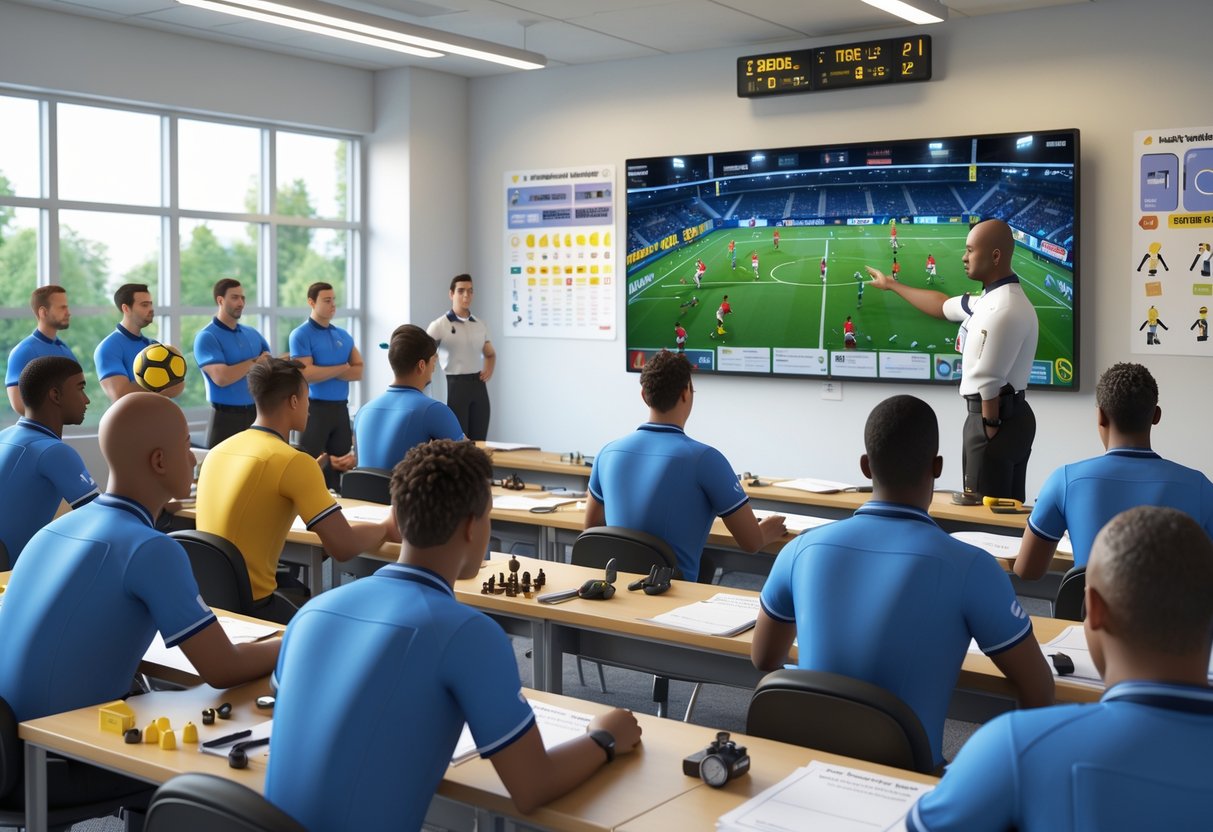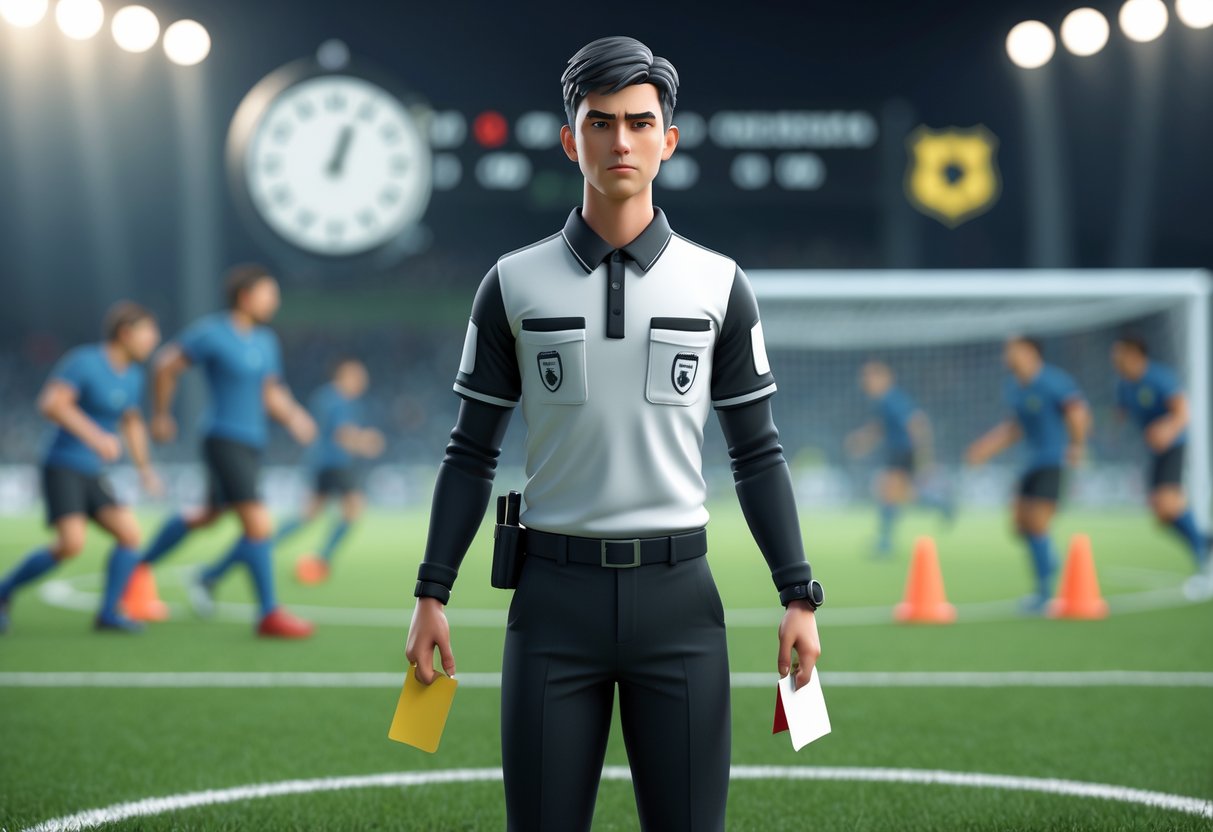Referee Certification: Essential Guide to Becoming a Referee
Updated On: October 23, 2025 by Aaron Connolly
What Is Referee Certification?
Referee certification proves you can officiate competitive matches by the book. It’s basically your ticket to keeping games fair and organized.
This system checks that every referee knows the rules, has the right skills, and can actually run the show with authority.
Overview of Certification Process
Usually, you’ll kick things off with an entry-level course that costs about £30-40. Most programs want you to be at least 13 years old before you can get started.
You’ll take an online course, dig into the match rules, and then tackle a written test. Once you pass, you send your credentials to local match assignors who’ll get you on the schedule.
Initial Requirements:
- Finish the online training modules
- Pass a written exam (70% or higher, usually)
- Submit your application and personal info
- Go through background checks if you’ll work youth matches
Most programs get you ready for youth, club, or school matches first. You’ll pick up skills like positioning, spotting fouls, and managing the game flow.
Physical fitness standards change depending on the sport, but you’ll need to run for a while without stopping. Football refs, for example, can end up running 6-8 miles in a single match.
Certifying Bodies and Organisations
Each sport has its own governing body for referee certification. In football, The FA (Football Association) runs the show for England.
Major Certifying Bodies:
- The FA – Football
- RFU – Rugby union
- England Basketball – Basketball
- England Hockey – Field hockey
These organizations set their own rules, fees, and how often you need to renew. Most certifications last 1-2 years before you have to recertify.
State and regional associations handle most of the local stuff. They give you course materials, run training sessions, and keep a database of referees for match assignments.
International giants like FIFA and World Rugby set the big-picture rules that everyone else needs to follow. That way, things stay consistent no matter where you’re reffing.
Importance of Official Certification
Official certification keeps things above board for both refs and players. Without it, you can’t ref sanctioned matches or get paid officially.
Insurance companies usually require valid certification before they’ll cover you. That means you’re protected if something goes wrong during a match or you get injured.
Key Benefits:
- Legal protection if there’s a dispute
- Insurance coverage for injuries or liability
- Access to higher-level matches and better pay
- Professional development as you climb the ladder
At the grassroots level, certified refs make £20-30 per match. If you’ve got more experience, you’ll earn more for senior games. Many refs work 2-4 matches every weekend during the season.
Certification opens doors. Once you’ve gained some experience, you can get more qualifications and ref bigger games with better pay.
If you want to get started, check with your local FA county association. Most offer online courses that fit around your schedule.
Eligibility Requirements for Referee Certification

Most referee certifications are open to anyone 13 or older, but requirements shift a bit depending on the sport and level. You’ll need basic communication skills and the willingness to learn the rules—nothing too wild for entry-level gigs.
Minimum Age Criteria
Minimum age varies by sport. Football (soccer) programs usually take people from age 13. Basketball and American football want you to be at least 16.
Age Requirements by Sport:
- Football (Soccer): 13+ years
- Basketball: 16+ years
- American Football: 16+ years
- Rugby: 18+ years
Younger refs usually start with youth matches nearby. They get recreational games and lower-level competitions while building up experience.
If you’re under 18, you’ll probably need your parents to sign off. As you move up, age limits go up too—pro leagues want refs to be 21 or older. Some top-level certifications have an upper age cap for first-timers, often around 35-40.
Skill and Experience Expectations
You don’t need officiating experience for entry-level positions. Most programs teach you everything through online courses and hands-on sessions.
The focus stays on learning the basics and making good decisions under pressure. New refs go through coursework on game mechanics, positioning, and signals.
You’ll take a written exam to show you know the rules. If you study, you’ll probably pass.
Typical Requirements Include:
- Pass an online theory exam (usually 70-80% minimum)
- Complete practical training
- Show basic fitness
- Understand safety protocols
After you’re certified, you’ll ref lower-level matches for at least two years. That’s how you get comfortable and pick up practical experience.
Regular assessments point out where you can improve.
Language and Communication Abilities
Good communication is a must. Refs have to explain their calls to players, coaches, sometimes even angry parents.
You’ll need to calm things down and keep control when things get heated. Certifications usually require basic reading and writing in the local language.
Written exams test if you understand the rules and can communicate. After matches, you’ll fill out incident reports, so clear writing helps.
Communication Requirements:
- Speak and understand the local language
- Write simple match reports
- Use a confident voice
- Show clear body language and signals
If you ever go international, extra language skills can really help. FIFA refs often speak more than one language, but for entry-level, you just need the local one.
Physical presence and confidence matter a lot, too. Training covers hand signals and how to stand so everyone knows what’s going on.
The Referee Certification Pathway
You’ll follow a pretty clear path from grassroots level all the way up to possibly reffing FIFA tournaments. It all starts with registration and an online course, then you move up through different license levels as you gain experience.
Initial Registration Process
If you’re 13 or older, you can start your referee certification journey. First, you’ll do a digital course that costs around £30-40.
You register through your national football association’s learning portal. The course covers basic rules, positioning, and how to manage a match.
Most people finish the training in just a few hours.
Key requirements include:
- Pass an online test
- Submit your credentials to a local assignor
- Buy a basic referee kit (shirt, shorts, whistle, cards)
After you’re certified, you’ll get the contact info for match assignors in your area. They’ll schedule your first games, usually youth or school matches.
Most new refs earn back their course fee in their first weekend. Each game pays about £15-25, and you can do 2-4 matches every weekend.
Types of Referee Levels
There are five main license levels now, much simpler than the old nine-grade system. Each level lets you ref different types of matches.
Grassroots Referee covers youth, club, and school matches. You just need the basic online course for this one.
Regional Referee handles competitive youth and adult amateur games. You’ll need extra training and field assessments from veteran refs.
National Referee works semi-pro and lower pro matches. You’ll need a few years’ experience and must pass both written and practical tests.
FIFA Referee is the top level. These folks handle international matches and big tournaments. Only a few make it this far after years of hard work.
You’ll need ongoing education and annual recertification to keep your license.
Upgrading Certification Levels
You can move up the ladder with time, more training, and by showing you can handle tougher matches. You’ll need at least two years at grassroots level before you can upgrade.
Upgrades involve more courses, exams, and on-the-field assessments. Experienced coaches will watch your matches and check how you manage the game and communicate.
Typical progression timeline:
- Years 1-2: Grassroots matches
- Years 3-5: Regional-level training
- Years 6+: Maybe national-level consideration
Fitness gets more important as you climb. FIFA refs have to pass tough fitness tests—sprints, endurance runs, the works.
Some refs decide to mentor others after gaining experience. The Referee Coach Pathway lets you guide newcomers while still learning yourself.
If you want to make it, stay consistent, keep learning, and connect with your local referee association.
Soccer Referee Certification Explained
Soccer referee certification has a clear path, starting at grassroots and going all the way to the pros. You’ll complete online courses, pass exams, and get real field experience, all under your local football association’s watch.
Unique Steps for Soccer Referees
You start your journey with an entry-level course for £40, open to anyone 13 or older. You’ll do this first certification online, focusing on the Laws of the Game and basic match management.
After you pass the online test, you send your credentials to the local assignors. They’re the ones who’ll line up your first games.
The certification process looks like this:
- Register for the digital grassroots course
- Study the online Laws of the Game
- Pass the exam
- Submit credentials to local assignors
- Get your first match assignments
You’ll need to ref lower-level matches for two years before you can move up. That gives you enough practical experience with youth and club games.
The money’s not bad—refs earn £20-30 per match and usually get 2-4 games each weekend during the season.
Key Training Components for Soccer
Training covers three big areas: Laws of the Game, match management, and putting it all into practice. The online course teaches you all 17 Laws, from the basics to tricky offside calls.
Essential training modules:
- Player safety and handling injuries
- Disciplinary actions (yellow and red cards)
- Offside rules and how to apply them
- Advantage play and when to stop the game
- Pre-match and post-match duties
You’ll learn to make quick decisions and keep control. Training puts a lot of focus on your positioning, how you talk to players and coaches, and managing tough situations on the field.
The course is really geared toward grassroots football—youth and amateur matches, not the pros. You’ll get tips on dealing with parents, managing subs, and what to do if weather interrupts play.
Practical training covers how to blow the whistle, use hand signals, and where to stand during play. You’ll also learn what gear you need and the dress code for refs.
Local and National Governing Bodies
The Football Association runs referee certification in England. Scotland, Wales, and Northern Ireland have their own organizations. In the U.S., the U.S. Soccer Federation handles things through state associations.
Local County FAs take care of:
- Processing new applications
- Assigning matches to certified refs
- Ongoing training and development
- Handling discipline and complaints
State and regional bodies coordinate:
| Responsibility | Local Level | National Level |
|---|---|---|
| Initial certification | County FA | Standards setting |
| Match assignments | Local assignors | Advanced courses |
| Basic training | Regional centres | Instructor certification |
| Discipline | County committees | Appeals process |
You’ll work directly with local assignors who know your availability and experience. They make sure every match has a qualified ref and help new ones get started.
National bodies set the minimum standards, but local branches often add their own requirements. Some areas want in-person training or a mentorship program on top of the online certification.
Training and Education for Referees

Referee training usually blends online study with hands-on practice. This combo builds the skills needed for match officiating.
Most programs offer mentorship and regular feedback. That support helps referees sharpen their decision-making.
Pre-Course Online Learning
Online modules kick off referee education before anyone sets foot on the pitch. These courses dig into the Laws of the Game, basic positioning, and common match situations.
Training materials often include video clips of fouls, offside calls, and card-worthy incidents. Interactive quizzes check your understanding of the rules and how to use them in real matches.
Core online topics include:
- Laws of the Game basics
- Signal techniques and where to stand
- Match management
- Safety protocols
Most online courses take 6-12 hours. They’re open 24/7, so you can study at your own pace before practical sessions.
The written exam usually needs an 80% to pass. If you don’t make it, you can retake the parts you missed.
In-Person or Field Sessions
Practical training brings theory to life on real pitches. These workshops focus on positioning, movement, and making quick decisions—stuff you just can’t learn online.
Instructors show how to signal and position yourself for various game moments. We run through movement drills that help referees stay close to the action but out of the way.
Field session activities:
- Positioning drills for different plays
- Signal and timing practice
- Communication with players and coaches
- Physical fitness checks
Sessions usually last 4-8 hours over a day or two. Small groups (8-12 people) keep things personal, so instructors can give everyone attention.
Many programs let trainees officiate mock games. That way, you get some real experience before your first competitive match.
Mentorship and Coaching Programmes
Veteran referees often guide newcomers through mentorship programs. These pair new officials with experienced mentors for ongoing support.
Mentors watch matches and give feedback on your positioning, decisions, and overall management. They spot what needs work and suggest how to train smarter.
Mentorship benefits include:
- Match observation and feedback
- Career advice
- Rule interpretation help
- Networking in the referee community
The Elite Referee Programme offers monthly online sessions and four in-person training days each year for promising officials. Coaches aim to get you ready for professional-level games.
Local associations often assign a mentor to work with you during your first season. Usually, this support sticks around until you’ve shown you can handle matches on your own.
Assessment and Feedback
Regular evaluations help referees track progress and spot what to work on. Assessors use written tests, practical demos, and match observations.
Performance reviews look at rule knowledge, positioning, fitness, and communication. Standard criteria make sure everyone gets a fair shot.
Assessment components:
- Written rule exams (annual)
- Physical fitness tests
- On-field evaluations
- Peer and player feedback
Continuing education keeps referees up to date with rule changes and best practices. Most associations require yearly recertification and fitness checks.
Video analysis tools let referees review their performances. Many training programs now include sessions where you can watch yourself from different angles and learn from it.
Background Checks and Safeguarding
All referees have to pass background checks and finish safeguarding training before they can officiate. These steps protect players—especially young ones—and make sure only the right people referee games.
Background Check Process
Background checks differ by organization, but the steps are pretty similar. Most referees 18 or older need to clear background screening with approved providers.
In the U.S., referees do a JDP background check through U.S. Soccer. This meets Olympic and Paralympic Committee rules. You do this after SafeSport training.
In the UK, referees use DBS checks. These show any criminal history that could make someone unfit to work with kids.
The background check usually takes 7-14 days. You’ll get an email link to fill out your info. Finish this within 14 days or you might have to start over.
Some organizations handle background checks automatically when you register. Others make you apply separately through their screening companies.
Safeguarding and Child Protection
Safeguarding training teaches referees how to protect kids and vulnerable adults in sport. It’s mandatory for anyone working with under-18 players.
The training covers spotting signs of abuse, how to behave around young players, and what to do if you need to report something. Most courses take 1-3 hours online.
UK referees complete Safeguarding for All training through the FA’s platform. This covers basic child protection and the specifics for sport.
You’ll learn about proper communication, physical contact, and keeping professional boundaries. The training also shows you what to do if you suspect abuse.
Social media guidelines are now part of safeguarding. Referees get tips on how to interact with young players online and what to avoid posting.
Age-Related Checks
Age affects what checks you need. Young referees have fewer requirements than adults.
Referees aged 14-17 usually skip full background checks. They do basic safeguarding training for their age group. Some organizations require parental consent.
Adult referees (18+) must do full background screening and more in-depth safeguarding training. This includes criminal record checks and reference checks.
Training content changes with age. Young referees get age-appropriate info, while adults get detailed training on spotting and reporting concerns.
Some leagues add extra checks for referees working with very young kids (under-12s). That might mean an enhanced DBS or extra training.
Renewals and Ongoing Compliance
Background checks and safeguarding qualifications expire, so you have to renew them regularly. Most organizations want updates every 3-5 years.
You need to keep your safeguarding qualification up to date to stay registered. If your training expires, you can’t officiate until you renew.
Background checks usually last three years. Some organizations do annual checks for those working at higher levels or with vulnerable groups.
Heads up: Lots of referees lose their spot because they forget to renew safeguarding training. Set reminders well before things expire.
Most organizations send you renewal emails. But ultimately, it’s on you to track expiry dates and renew on time. If you miss the deadline, you might have to redo the whole process, not just update your current clearance.
Examinations and Testing

Most referee certifications ask you to pass both written exams on rules and practical assessments where experienced officials watch you in action. The bar is set high—many sports want 80-90% on written tests.
Written Rules Exams
Written exams check your grasp of official rules, regulations, and how things work in your sport. Most tests happen online now, through the governing body’s site.
Exam Format and Content
- Multiple choice questions about rule scenarios
- Weapon-specific sections for sports like fencing
- General officiating and safety basics
- Time limits: usually 60-120 minutes
Preparation Requirements You’ll need to study the rulebook thoroughly before the exam. Most organizations share study guides with practice questions and key points.
Download the prep materials early. The guides often give practical tips, not just what you need to pass.
Cost and Retakes Exam fees vary, but expect £30-50. Most organizations let you retake the exam within 48 hours if you don’t pass the first time.
Some sports want you to do refresher exams every two years to keep your certification.
Practical Assessments
Practical exams check if you can officiate real matches while someone observes. These usually happen during live games or special sessions.
Assessment Process A certified examiner watches you ref a match and scores your work. They look at positioning, how you apply rules, and how you talk to players.
You need to show confidence when making calls and managing the game. The examiner wants to see you apply rules consistently.
Real-Match Environment Practical tests use competitive matches, not simulations. That way, you face the real pressure and surprises you’ll see as a certified referee.
Minimum Experience Requirements Most sports make you officiate a set number of informal games before the practical exam. This gives you the experience you need before formal testing.
Passing Criteria
Passing standards stay high to keep officiating quality consistent.
Written Exam Standards Most sports want 80-90% on written exams. You have to pass both general and any sport-specific sections.
If you fail a section, you usually just retake that part.
Practical Assessment Scoring Practical exams use detailed rubrics for rule knowledge, positioning, communication, and match management. You need to show you’re competent in all areas.
Certification Levels Passing gets you an initial rating (often called ‘P’ for pass) that lets you officiate locally. Higher ratings need more experience and further tests.
Advanced certifications may want you to ref a minimum number of matches at each level before moving up.
Cost and Fees Associated with Certification

Referee certification costs change depending on the sport and level, but most new refs should plan for £100-300 upfront. Let’s break down registration fees, background checks, and equipment so you know what you’re in for.
Registration and Course Fees
Most referee programs charge £40-170 for initial certification. That covers your course, exams, and first-year license.
Soccer refs usually pay £80-100 through groups like US Soccer. Basketball and American football cost about the same. Higher-level certifications, like regional status, can hit £300.
What’s usually included:
- Online training modules
- Certification exam
- First-year membership
- Basic rule books
Many associations skip membership fees for your first year. After that, expect annual dues of £40-60 to stay certified.
Some organizations offer payment plans if the upfront cost is tough. Check with your local referee association about financial assistance if you need it.
Background Check Fees
All referees over 18 need background screening before officiating. These checks run £20-100, depending on your sport and location.
Common requirements:
- Criminal background check (£23-50)
- Fingerprinting/live scan (£50-80)
- SafeSport certification (usually free)
Youth sports often need more detailed checks. Expect higher fees for children’s leagues.
Background checks last 2-3 years before you have to renew. Keep these recurring costs in mind for your referee budget.
Additional Costs (Equipment, Kit)
A referee starter kit costs £75-150. That gets you uniforms, a whistle, flags, and the basics for most games.
Essential equipment:
- Official shirts (2-3 colors): £30-50
- Shorts and socks: £20-30
- Whistle and lanyard: £10-15
- Flags for linesmen: £15-25
Higher-level refs need gear like communication headsets (£100-200) and pro uniforms. Wait until you move up before buying top-tier equipment.
Many certification packages throw in a basic starter kit, which saves money compared to buying everything separately.
Maintaining and Renewing Your Certification

All referees have to renew their certification each year to stay active. This means finishing recertification courses, meeting educational requirements, and passing any needed tests for your level.
Annual Renewal Process
Every referee has to complete an annual recertification course to keep their license active. You can only recertify if your license hasn’t lapsed for more than three registration years.
Grassroots referees take a basic recertification course each year. This usually means updated rules training and some basic educational modules.
Regional and higher-level referees deal with stricter requirements. They attend advanced recertification courses and have to pass extra tests.
The process depends on your state, but most referees need to:
- Finish online training modules
- Pass written exams
- Go to in-person or virtual seminars
Quick win: Sign up for recertification early in the registration period. That way, you can avoid last-minute stress or full courses.
Most referees make £20-30 per match and work 2-4 games each weekend. That’s more than enough to cover your annual recertification costs.
Continuing Education
Advanced referee grades require more than just basic recertification. They have specific fitness, testing, and educational standards.
Regional referees have to pass annual fitness tests with sprints and interval runs. They also need to score high on regional-level written exams about advanced rules and game management.
Higher levels require field evaluations. Regional referees must earn two passing evaluations each year, and at least one must be from an adult amateur match.
Fitness standards include:
- 6×40 metre sprints
- FIFA interval tests with set time limits
- Different requirements for men and women
Warning: If you fail an evaluation, it won’t count. You’ll have to retake it.
Some states want referees to get more game experience. Wisconsin, for example, will require regional referees to officiate at least five adult matches each year starting in 2025.
Upgrading Skills and Levels
Moving up the referee ladder takes real commitment—time, money, and preparation. Each level comes with its own prerequisites.
To reach Grassroots GR-7 level:
- Pass one field evaluation on a competitive match
- Have experience at U17 or higher
- Pass the advanced recertification course
Regional referee upgrade requirements:
- Be at least 18
- Hold a grassroots license for three straight years
- Work 25 games as referee and 15 as assistant at the adult amateur level
- Pass fitness and written tests
- Get three passing evaluations from different referee coaches
You’ll need to submit a detailed portfolio by November 1st. This includes game records, evaluation history, and things like instruction or mentoring roles.
Next step: Reach out to your state director of assessment to talk through upgrade requirements and start a development plan.
Opportunities After Certification

Getting certified opens up regular match assignments and real career growth paths. You can start with local games and move up to higher levels over time.
Match Assignments and Opportunities
After you’ve passed certification, local assignors will start scheduling you for matches. Usually, you’ll begin with youth recreation, club, middle school, and junior varsity games in your area.
Most new referees work 2-4 matches per weekend during football season. Pay changes by region, but you’ll usually get £15-25 per match at grassroots level.
Common starting assignments:
- Under-12 recreational leagues
- School district matches
- Local club tournaments
- Community centre games
Qualified referees are in high demand across the UK. Many areas struggle with shortages, so certified officials get steady work.
Flexible scheduling really helps if you have other commitments. You can accept or turn down assignments based on your schedule. The more games you handle, the more assignments you’ll get down the road.
Progression to Higher Levels
After two years at grassroots level, you can take extra training courses. This step-by-step system helps you build skills and confidence at a manageable pace.
The usual advancement pathway:
- Level 7-6: Youth and amateur adult games
- Level 5-4: Semi-professional and county competitions
- Level 3-2: National League and professional matches
- Level 1: Premier League and international games
Each level asks you to finish specific courses and show your skills through match assessments. You’ll need to pass written exams and get positive evaluations from senior referees.
Regional football associations offer mentorships with experienced officials. These relationships can really help you improve your match management skills and learn how to handle tricky situations.
Path to Professional Refereeing
Reaching professional refereeing takes a lot of dedication and time. Most officials spend 8-12 years getting to semi-professional levels, and only a few make it to the top.
Premier League referees earn impressive pay. Match fees can go from £1,500 for regular games to £5,500 for major fixtures, plus annual retainer fees.
Key requirements for moving up:
- Top-level fitness (regular testing)
- Consistently strong match performances
- Great communication and decision-making
- Willingness to travel and train often
Experienced referees can also become instructors, assessors, or referee developers. These roles let you train new officials and evaluate performances throughout your region.
The skills you pick up as a referee—conflict resolution, quick decisions under pressure, leadership—transfer well to business or coaching jobs.
Common Challenges and Tips for New Referees

New referees usually face three big challenges: building real confidence while making mistakes, handling serious pressure from players and parents, and fitting referee duties around work or school.
Building Confidence on the Pitch
Confidence starts before the match even begins. Arrive 30 minutes early and do all your pre-match checks. This routine helps you feel ready and shows people you mean business.
Your body language matters—a lot. Stand tall, make clear decisions, and look players and coaches in the eye. Even if you’re unsure, acting confident cuts down arguments.
Master the basics first. Really get to know the Laws of the Game, pick up on local rules, and work on your positioning. Players notice when you hesitate, so solid knowledge gives you true confidence.
Let your whistle do the talking. A strong, clear blast gets respect and shows you’re in charge. Adjust the volume: use a loud whistle for serious fouls, quieter for the small stuff.
Learn something from every match. You’ll make mistakes as a new referee—everyone does. Focus on getting better each game. Work with experienced officials when you can and ask questions during breaks.
| Confidence Builder | Impact |
|---|---|
| Proper pre-match preparation | Reduces anxiety by 60% |
| Firm whistle technique | Cuts arguments in half |
| Strong body language | Increases player respect |
| Knowledge of Laws | Builds decision-making speed |
Dealing with Pressure
Pressure hits from all sides during matches. Coaches shout, players question your calls, and parents complain from the stands. Expect it—it’s just part of the job.
Set ground rules right away. Greet coaches confidently, shake their hands, and make eye contact. Give players clear instructions so they know you’re in control.
Focus on what you can actually control. You can’t change how others react, but you can control your own prep, positioning, and response. Before matches, make a mental list of what’s in your control and what isn’t.
Use clear hand signals and point directions with straight arms. Decisive gestures cut confusion and show you’re sure about your calls. If you look hesitant, people will challenge you.
Grow a thick skin fast. Not everyone will agree with your decisions—honestly, that’s just how it goes. Even pros get criticised. Just make the best call you can with the info you have.
If you deal with aggressive coaches or players, stay calm and keep it professional. Don’t argue or take things personally. Your job is to officiate, not to win a popularity contest.
Balancing Refereeing with Other Commitments
Most new referees juggle a lot. School, work, family, and social life all compete with referee duties. The successful ones plan their schedules and keep assignors in the loop.
Tell your assignor about any restrictions right away. If you play, work, or have family stuff, let them know. Honest communication stops last-minute problems.
Start small and build up. Take one or two matches each weekend at first instead of overloading yourself. Good officiating takes focus and energy, and you’ll burn out fast if you overdo it.
If you accept multiple games in a day, give yourself enough travel time between venues. Rushing just makes you stressed and your officiating suffers.
Make a referee kit checklist to save time on match days:
- Two watches with stopwatch functions
- Spare whistle
- Red and yellow cards
- Notebook and pens
- Weather-appropriate clothing
- Water and snacks
Set aside time for post-match reports and travel. A lot of new referees underestimate admin work and travel, which leads to rushed decisions about future games.
Let family and friends know about your referee commitments. Explain that being consistently available helps build your reputation and brings better assignments.
Frequently Asked Questions

Most sports set the minimum age for becoming a certified referee at 13, but it can vary depending on the sport and region. The process usually involves training courses, written exams, and ongoing recertification.
How can one become a certified referee for football?
To get certified as a football referee, sign up for a training programme through your local football association. Most places run beginner courses covering the Laws of the Game and basic officiating skills.
You’ll go through classroom sessions and practical fieldwork. You’ll learn things like positioning, signalling, and match management by actually doing them.
After training, you’ll take a written exam on football rules. Passing scores vary, but you’ll usually need at least 75%.
New referees usually start with youth or lower-level adult games. That gives you a chance to gain experience before moving up.
What are the steps to get certified as a soccer referee for youth matches?
First, reach out to your local soccer association or referee committee to find upcoming courses. Many run certification programmes all year.
Sign up for a course—it’ll probably cost between £30-80. Your fee covers study materials, training, and exams.
Complete the required training, which usually means 12-20 hours of instruction. You’ll cover rule interpretation, positioning, and youth-specific stuff.
Pass both written and practical exams. You’ll need to show you know the Laws of the Game and can handle the basics.
Send in your certification application with proof of training, exam results, and a background check.
Could you tell me what qualifications are necessary to be a basketball referee?
You’ll need to be at least 16 for most basketball referee certifications. Some youth programmes let 14-year-olds start at entry level.
Take a certified officiating course through your national basketball association. The course covers rules, mechanics, and game management.
Pass written exams on basketball rules and officiating. Most places want at least 80% to pass.
Show your skills in supervised games or clinic assessments. Experienced referees will check your positioning and decision-making.
Stay certified by finishing annual recertification and continuing education. Most associations require 8-12 hours of ongoing training each year.
What’s the process for obtaining a U.S. soccer referee certification?
Go to the U.S. Soccer website and create an account through their referee system. You’ll need to give some personal details and emergency contacts.
Register for a certification course in your area. Entry-level Grade 8 courses run regularly across the country.
Finish about 16-20 hours of training on the Laws of the Game, positioning, and match control. Courses blend classroom and field work.
Pass the written exam with at least 75%. The test covers rules and practical scenarios.
Complete a background check and SafeSport certification if you’ll be working with youth players. These steps help keep everyone safe.
Where might I find soccer referee certification courses near my location?
Check your state soccer association’s website for upcoming referee courses. Most keep an online calendar with training sessions and locations.
Contact local soccer clubs and leagues—they often host referee courses for their competitions.
Visit the U.S. Soccer referee section online for a course locator tool. Search by postcode or city to see what’s nearby.
Ask at local sports centres and community colleges. They often run referee training during the off-season.
Reach out to experienced referees in your area through social media groups. They usually know about upcoming courses and can point you in the right direction.
What specific requirements must I meet to be a soccer referee in California?
You need to be at least 13 years old before you can start referee certification in California. If you’re younger, you’ll probably need your parent’s consent and maybe some extra supervision, too.
Sign up for a U.S. Soccer-approved referee course. Cal South or Cal North soccer associations usually handle these courses and keep an eye on referee training.
You’ll have to take the Grade 8 referee exam and score at least 75%. The test covers the Laws of the Game and some basic stuff about officiating.
The association will ask you to go through a background screening with their approved vendors. Usually, this takes about one to two weeks and costs around £25.
Each year, you need to complete recertification, which means keeping up with rule changes and doing some continuing education. California expects referees to spend about four to six hours on ongoing training every year if they want to stay certified.








